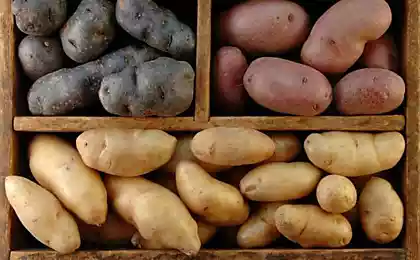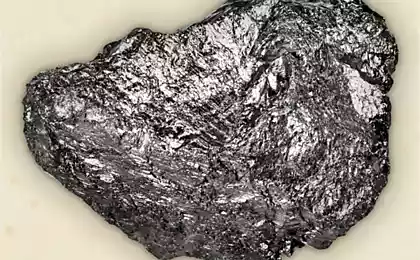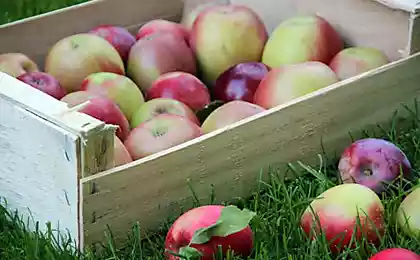500
How to organize a pantry for food storage
One of the first conditions of good nutrition and cooking is creating a good database, so you should start with the pantry. Accessibility to all necessary ingredients, makes the process of cooking less stressful and time consuming.
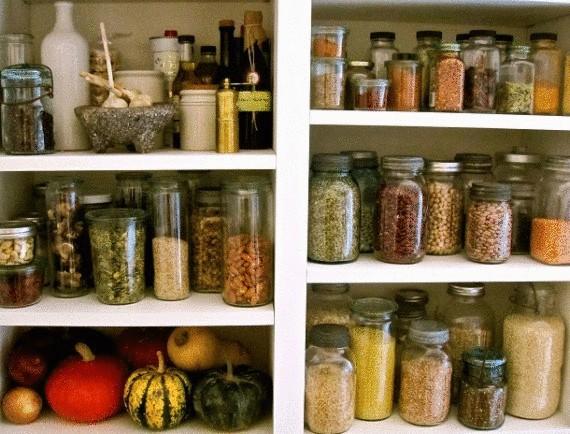
Task purchases — to simplify single meal, but if we begin to cook, then usually a few dishes for a few days. This is just one of the reasons why it is so important to have a well-stocked pantry.
helps us to stay away from packaged and processed foods.
makes it easy to come up with a dish at the last moment.
saves our money, allowing you to make the stock when there is a sale of seasonal products.
we will always have food in case of emergencies
helps to maintain a healthy diet full of real foods.
In order to determine what items you should stock in your pantry, you first need to look at what you typically use more often. From harvesting dry peas, for example, you won't do any good if you never cook.
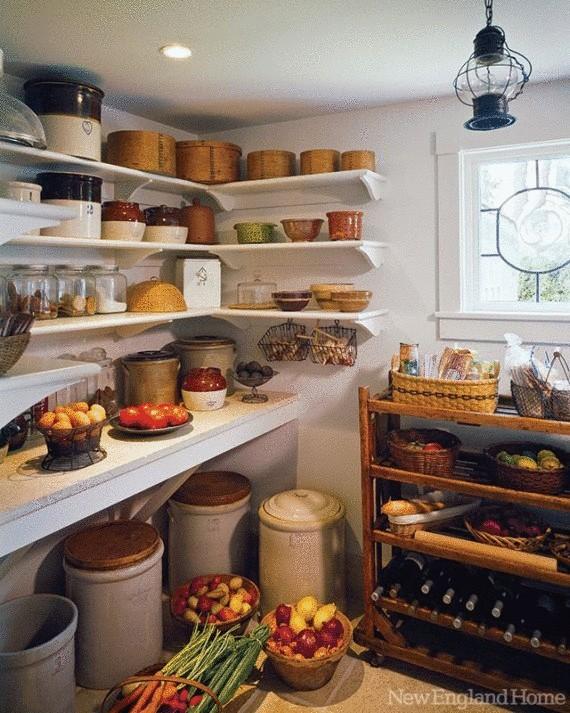
The easiest way to do this is to write your menu for two or three weeks, or looking at what you have been preparing for this period of time. View what ingredients you use most often; it is better to always have them on hand.
Next, consider your needs in baking. And maybe bake bread? Often preparing cookies and cakes for dessert? Make muesli? It is possible to allocate shelf under pastries in your pantry.
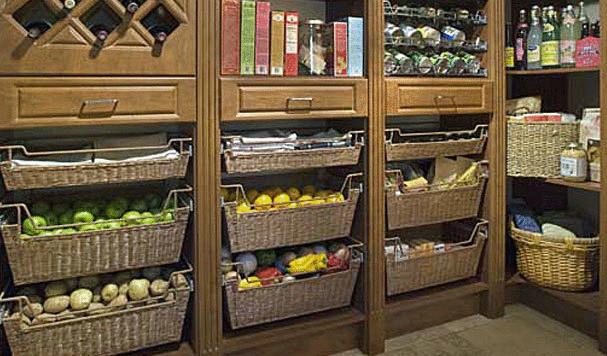
Also pay attention to specific ingredients that you love to cook in my family. Perhaps you are doing flax or hemp oil. For this you will need seeds with high humidity.
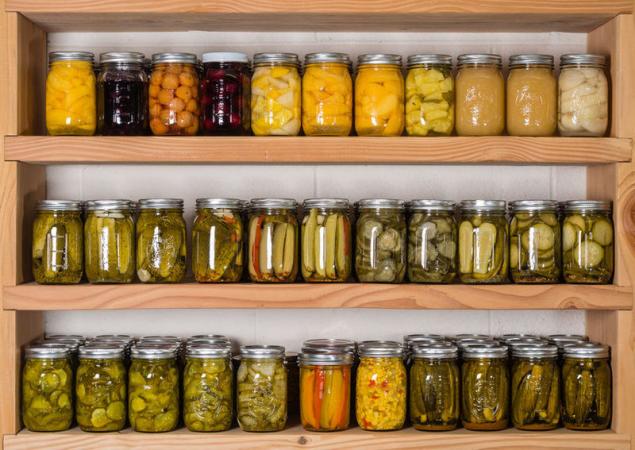
Here are the basic products that do not require cold which usually keep in the pantry :
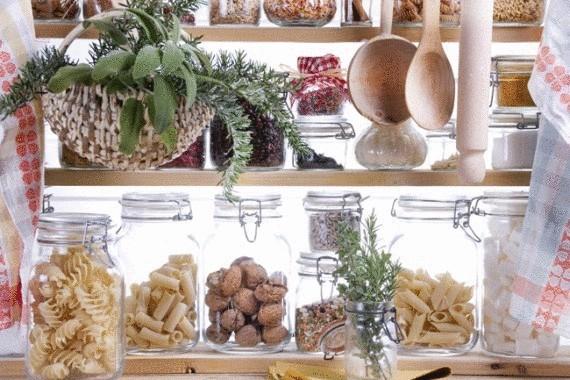
Flour — wheat coarse and fine grinding, rye, rice.
Sugar — white, brown, cane or beet, sand, sugar.
Several different shapes and sizes grains — couscous, rice, barley, quinoa, oats, flax, cornmeal, buckwheat
Oils — olive oil, canola oil, coconut oil, peanut oil, sesame oil
Vegetables — onion, potato, garlic
Tomatoes — sauce, diced, paste.
Spreads — peanut, almond oil and hazelnut jam
Natural sweeteners — honey, maple syrup, agave
Vinegars — balsamic, white, red wine, cider, rice
Specialty Sauces — hot sauce, Tabasco, oyster sauce, mirin, rice wine, soy sauce
Nuts — almonds, walnuts, pecans, pine nuts, coconut Dried fruit — raisins, dried apricots, dates, cherries, cranberries Dried or canned beans — black, Navy blue, beans, peas, chickpeas, mung beans
Pasta — macaroni, vermicelli, noodles
Canned fish / seafood — tuna, salmon, mussels, sardines, anchovies
Specialty items — artichoke hearts, sun-dried tomatoes, olives
Herbs and spices — oregano, Basil, parsley, rosemary, cumin, peppers and many more salts — kosher, sea salt, salt for salting, rock salt
Baking ingredients — baking powder, soda, yeast, cream of Tartar, chocolate
Extracts — vanilla, almond, lemon, peppermint Drinks — coffee, tea, cocoa, pudding, jelly, custard.

Task purchases — to simplify single meal, but if we begin to cook, then usually a few dishes for a few days. This is just one of the reasons why it is so important to have a well-stocked pantry.
helps us to stay away from packaged and processed foods.
makes it easy to come up with a dish at the last moment.
saves our money, allowing you to make the stock when there is a sale of seasonal products.
we will always have food in case of emergencies
helps to maintain a healthy diet full of real foods.
In order to determine what items you should stock in your pantry, you first need to look at what you typically use more often. From harvesting dry peas, for example, you won't do any good if you never cook.

The easiest way to do this is to write your menu for two or three weeks, or looking at what you have been preparing for this period of time. View what ingredients you use most often; it is better to always have them on hand.
Next, consider your needs in baking. And maybe bake bread? Often preparing cookies and cakes for dessert? Make muesli? It is possible to allocate shelf under pastries in your pantry.

Also pay attention to specific ingredients that you love to cook in my family. Perhaps you are doing flax or hemp oil. For this you will need seeds with high humidity.

Here are the basic products that do not require cold which usually keep in the pantry :

Flour — wheat coarse and fine grinding, rye, rice.
Sugar — white, brown, cane or beet, sand, sugar.
Several different shapes and sizes grains — couscous, rice, barley, quinoa, oats, flax, cornmeal, buckwheat
Oils — olive oil, canola oil, coconut oil, peanut oil, sesame oil
Vegetables — onion, potato, garlic
Tomatoes — sauce, diced, paste.
Spreads — peanut, almond oil and hazelnut jam
Natural sweeteners — honey, maple syrup, agave
Vinegars — balsamic, white, red wine, cider, rice
Specialty Sauces — hot sauce, Tabasco, oyster sauce, mirin, rice wine, soy sauce
Nuts — almonds, walnuts, pecans, pine nuts, coconut Dried fruit — raisins, dried apricots, dates, cherries, cranberries Dried or canned beans — black, Navy blue, beans, peas, chickpeas, mung beans
Pasta — macaroni, vermicelli, noodles
Canned fish / seafood — tuna, salmon, mussels, sardines, anchovies
Specialty items — artichoke hearts, sun-dried tomatoes, olives
Herbs and spices — oregano, Basil, parsley, rosemary, cumin, peppers and many more salts — kosher, sea salt, salt for salting, rock salt
Baking ingredients — baking powder, soda, yeast, cream of Tartar, chocolate
Extracts — vanilla, almond, lemon, peppermint Drinks — coffee, tea, cocoa, pudding, jelly, custard.
3 disadvantage of the construction of a clay house by Ianto Evans
Scientists herpes increases the risk of dementia













